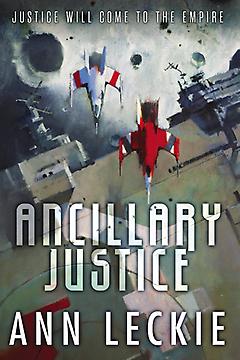It’s not every day a debut novel by an author you’d never heard of before derails your entire afternoon with its brilliance. But when my review copy of Ancillary Justice arrived, that’s exactly what it did. In fact, it arrowed upward to reach a pretty high position on my list of best space opera novels ever.
Which is to say: Ancillary Justice is a novel about which I need to forcibly restrain myself from making high-pitched enthusiastic noises. YOU SHOULD ALL READ IT.
Ahem.
Ancillary Justice does many things extremely well. Told in the first person, it’s a narrative in two parts: the present, which comprises a thriller plot (among other things) in which Breq, the last surviving ancillary soldier from the now-destroyed vessel Justice of Toren seeks to acquire a weapon with which Breq can kill the Lord of the Radch; and the past, where we learn what happened to set Breq on the path towards a quixotic and at first glance unattainable revenge. Leckie’s prose is clear and muscular, with a strong forward impetus, like the best of thriller writing. It grabs you and urges you onwards. And her interleaved narrative is both clever and well-executed: clever, because alternating past and present heightens the novel’s tension, ratcheting up the what happens next? factor, and well-executed because most of the breaks and pauses seem entirely natural, rather than forced.
It’s a good thriller, even if some events come together in ways that appear too easily coincidental: Leckie writes a rousing climax and sticks the dismount.
And in the past sections, there’s a really interesting exploration of the narrative possibilities of first person point of view for post-human characters: entities whose consciousness is distributed across multiple bodies. It opens up the field of view contained within the narrative I.* This post-human—but not post-fleshly—vision provides a significant part of the backdrop for Ancillary Justice’s events. Breq is an ancillary soldier, created from the dead bodies of conquered peoples, part of the distributed consciousness of the ship Justice of Toren. The Lord of the Radch, against whom Breq’s revenge is directed, is not only multi-bodied, but also self-divided, parts of the Lord’s consciousness carrying out secret actions against other parts.
*Pun most definitely intended.
As for worldbuilding: Leckie’s really good at it. During the course of the story we spend time in three separate planetary or extra-planetary locations within and on the fringes of the empire known as the Radch. One is a planet recently conquered and not yet assimilated. One is not within the bounds of the empire. And one is a central hub, at the heart of Radchaai culture and dominion. Each are depicted not only with their own individual cultures and subcultures, but with strong internal variations and divisions. Moreover, Leckie enlarges on an ongoing thematic critique of the nature and purposes of empires—particularly expansionist ones.
Up to now, I haven’t mentioned the most striking aspect of Ancillary Justice.
The pronouns.
Radchaai language doesn’t use gendered pronouns, usually. Since Breq is culturally Radchaai, Ancillary Justice uses only one pronoun to refer to all its characters, except where Breq is making an effort to be culturally sensitive. Leckie has chosen—in a move that can be contrasted with The Left Hand of Darkness—to use the English feminine pronoun throughout the text. It’s an interesting choice, one that adds to the sense of reading in a different culture, but also one which (as had to be pointed out to me) runs the risk of reinforcing our existing linguistic and cultural gender binaries.
On the whole, it’s an ambitious trick and I think it works: every time Leckie uses a female-gendered pronoun to refer to a person whose gender has not been specified or has been specified as male it made me re-examine all my assumptions about how worlds and genders fit together. I am left to consider how gender is constructed and how I react to gendered and ungendered pronouns in text: trying to look at it from five different directions at once.
Half of them are this is awesome. Half of them are why is this my first reaction?
In sum, Ancillary Justice is both an immensely fun novel, and a conceptually ambitious one: it has many layers and many levels at which it can be enjoyed. And I can’t hardly wait for the sequel.
Ancillary Justice is available October 1st from Orbit
Liz Bourke is a cranky person who reads books. Ancillary Justice made her extraordinarily less cranky. Her blog. Her twitter.










